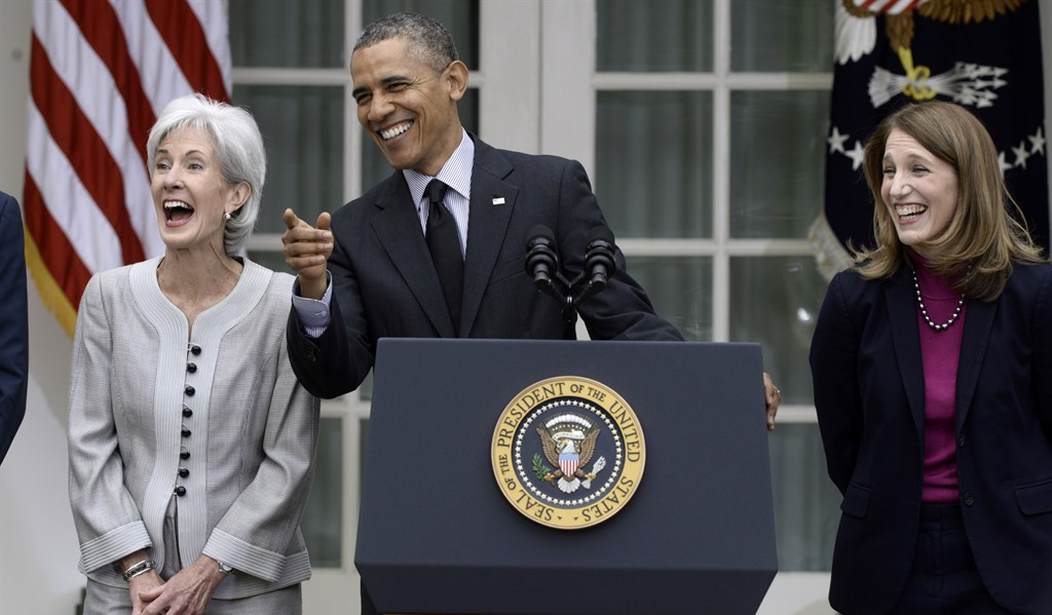Obamacare "is working" and "proving critics wrong," its supporters like to insist -- relying heavily on assertion, willful ignorance, moved goalposts
Advertisement
Nearly half of the 17 insurance marketplaces set up by the states and the District under President Obama’s health law are struggling financially, presenting state officials with an unexpected and serious challenge five years after the passage of the landmark Affordable Care Act. Many of the online exchanges are wrestling with surging costs, especially for balky technology and expensive customer call centers — and tepid enrollment numbers. To ease the fiscal distress, officials are considering raising fees on insurers, sharing costs with other states and pressing state lawmakers for cash infusions.
As we've noted previously, the law has been a drag on the already-strained budget in California, which has been touted as a shining example of state-level Obamacare implementation. Next we have miscalculated subsidies, resulting in millions of enrollees facing higher tax bills:
Back in January, H&R Block figured that about half of the 6.8 million people who were getting ObamaCare subsidies would owe some of the money back. Another expert reckoned the average payback at $208. That was enough to set off alarms about the "unpleasant tax surprise" these millions would face. The tax experts were too optimistic, however. H&R Block now figures that two-thirds of ObamaCare enrollees who got subsidies had to pay at least some of it back. And the average payback was $729. So roughly 5.5 million ObamaCare enrollees had to return, on average, almost a quarter of their premium subsidies. Given that these subsidies are available only to families with modest incomes, that's got to hurt.
Recommended
Advertisement
Meanwhile, it looks like taxpayer-funded insurer 'bailout' funds are woefully ill-equipped to help cover the losses incurred by the industry -- which are partially attributable to the older, sicker risk pools Obamacare attracted, coupled with the law's guaranteed issue and community rating provisions:
There may be just $1 in the piggy bank to cover every $10 in claims at an Obamacare program designed to spread risk among insurers, Standard & Poor’s said. The “risk corridor” program was designed to bolster plans that suffered losses on health-care insurance exchanges, in part by taking funds from those that turned a profit. It was one of three risk-sharing initiatives that help companies adjust to the Affordable Care Act. Yet companies mostly did poorly in state marketplaces, leaving the amount insurers expect to pay into the program at less than 10 percent of what others expect to get out, S&P found. And a bill passed last year doesn’t let the government use its own funds to make up the difference. “The only money they can use to pay the insurers who are on the downside is money coming in from insurers who are profitable,” S&P analyst Deep Banerjee said. Most insurers “ended up being on the loss side of the corridor. That’s why we are here.” The shortfall could mean higher premiums for customers and may threaten the viability of some smaller insurers…"
Advertisement
Some healthcare experts have warned that relatively modest average premium increases for consumers so far (with many experiencing sharp hikes, along with hefty out-of-pocket costs and access shock) won't be sustainable once certain bailout-style payment systems and other price controls expire in the coming years. During the Obamacare debate of 2009 and 2010, the president and Democratic supporters of the law promised Americans that their proposed reforms would significantly reduce premiums:
UPDATE - Another data point on Obamacare's failure to reduce uncompensated care:
Yet another ObamaCare lie exposed: ER visits are on the rise #medicaiddoesnotwork #sayfie pic.twitter.com/bNucveP42v
— Matt Gaetz (@mattgaetz) May 4, 2015
























Join the conversation as a VIP Member